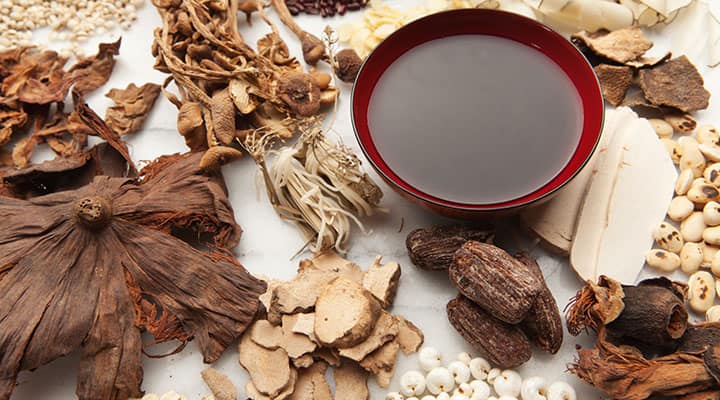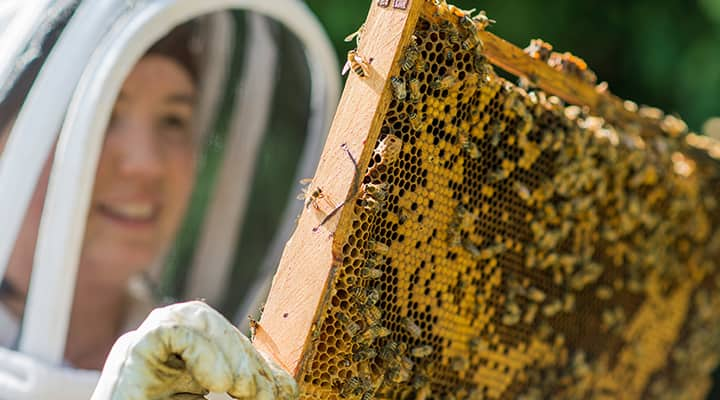
Reishi Mushroom Benefits: 13 Reasons You Need Them in Your Diet
Published: March 2023
Mushrooms may be known for their mystical properties, but even non-hallucinogenic mushrooms can be magical. The effects of reishi mushrooms and others—like shiitake, maitake and chaga mushrooms—on immune system health and immune function are widely touted—and those aren't the only health benefits of this fabulous fungus.
In fact, we can list 13 reasons why you might want to incorporate reishi into your wellness routine.
What are reishi mushrooms?
Reishi mushrooms are not typical culinary mushrooms, like portobello or button mushrooms. Also known as Ganoderma lucidum, reishi mushrooms are large, dark, bitter-tasting fungi with a glossy exterior and woody texture. They've been used for many years in Chinese medicine and other Asian countries to promote overall good health, including modulating immune function, increasing energy and promoting longevity. Because of their incredible purported benefits, they are often referred to as medicinal mushrooms.
In China, Ganoderma lucidum is called Ganoderma lingzhi. The name lingzhi represents a combination of spiritual potency and essence of immortality, and it is regarded as the "herb of spiritual potency," symbolizing success, well-being, divine power and longevity.
13 reishi mushroom health benefits
While the various beliefs regarding the health benefits of Ganoderma lucidum are largely based on anecdotal evidence and traditional use, there has been increasing scientific support recently for some of the ancient claims. In fact, one review paper looked at data from 210 preclinical articles and found evidence of a wealth of reishi effects, including anticancer, antibacterial, antiobesity, anti-inflammatory, neuroprotective and antidepressant activity.
The top health benefits of reishi include the following:
1. Immune system support
One of the most well-known health benefits of reishi mushrooms is its immune-supporting abilities and protection against aging immune cells. Research shows that beta-glucans, polysaccharides present in reishi mushrooms as well as other mushrooms, demonstrate immuno-modulating activities. Beta-glucans, specifically β-D-glucans in reishi mushrooms, offer immune support.
2. Fight inflammation
Evidence from preclinical studies supports the use of reishi in helping fight inflammation. Reductions in markers of inflammation have been observed in cell and animal studies.
3. Heart health
Another potential use and health benefit of reishi mushrooms is heart health, thanks to their cholesterol-lowering abilities. Some research has shown that those with high blood pressure may achieve lower blood pressure with the use of Ganoderma lucidum. Keeping blood pressure and cholesterol within a normal healthy range can help support heart health and reduce heart attack and stroke risk.
4. Antioxidant properties
Antioxidants are molecules that help prevent damage to cells. Ganoderma lucidum contains various compounds that may help increase antioxidant status in the body.
5. Liver health/detoxification
In several in vivo studies looking at reishi mushrooms, liver protective effects were shown due to a myriad of mechanisms, including an increase in free radical scavenging. Free radicals are unstable molecules that have been shown to contribute to many chronic health problems including cancer and liver disease.
6. Brain health
Reishi's neuroprotective activity has been demonstrated in both animal and cell cultures via decreasing neuronal damage and cell death. The neuroprotection of reishi mushrooms may help improve memory, cognition and protect the brain against age-related diseases, such as dementia and Alzheimer's.
7. Skin health
Reishi mushroom may help benefit your skin as well. In a pre-clinical trial, an active ingredient isolated from Ganoderma lucidum was found to help support burn wound healing.
8. Cancer protection
For more than 30 years, medicinal mushrooms such as Ganoderma lucidum have been approved as an addition to standard treatments in cancer patients in Japan and China. Medicinal mushrooms are currently being studied to find out how they affect the immune system and if they stop or slow the growth of cancer cells.
In a 2021 review of the literature, authors present evidence of the anticancer activity of Ganoderma lucidum against many forms of cancer, including breast cancer, cervical cancer, lung cancer, prostate cancer, colorectal cancer and more. Overall, the mechanism effects of reishi lead to a decrease in tumor volume, growth, progression and cancer cell viability while increasing cancer cell death and immunomodulatory activity.
9. May help manage blood sugar in type 2 diabetes
Ganoderma lucidum may have an antidiabetic effect in those with type 2 diabetes, including a decrease in cell resistance to insulin and a decrease in HbA1c, an average blood glucose reading and marker of diabetes. Keeping blood sugar levels within a key range is essential for managing type 2 diabetes. Insulin manages blood sugar levels by helping blood sugar enter the body's cells so it can be used for energy.
10. Help with allergies
Studies suggest that reishi mushrooms may have an anti-histaminic effect, relieving most symptoms in hay fever patients, such as a runny nose, itchy eyes, congestion and sneezing, due to their immunoregulatory properties.
11. Mood
Ganoderma lucidum is considered to be an adaptogen — meaning that it may help regulate the body's stress response.
Additionally, studies in Swiss albino mice have reported a decrease in anxiety in these animals after taking reishi mushroom. However, a proper and well-explained mechanism for reishi’s effect is not reported.
12. Longevity
Ganoderma lucidum may help you live longer! Its potential anti-aging properties are primarily due to its anti-oxidation, immunomodulation and anti-neurodegeneration mechanisms, which may help slow down the aging process.
13. Energy and fatigue
Reishi mushrooms may also improve physical fitness in women with fibromyalgia.
How to consume reishi mushrooms
Reishi mushrooms are considered too tough to eat and have been used solely for medicinal purposes. There are various forms of Ganoderma lucidum available, including powders, extracts and tea, which are produced from different parts of the mushroom, including mycelia, spores and fruiting body.
Reishi extracts are typically water soluble and can be mixed into beverages such as tea or water. You can also order real mushrooms from growers, and you are often given the choice of organic mushrooms versus conventionally grown.
Other Beneficial Mushrooms
Reishi isn't the only mushroom out there famous for outstanding health benefits! Other mushrooms, such as shiitake, maitake and chaga mushrooms, are also immune system superstars, thanks to the immune-supporting action of beta-glucans. And if you're into eating real mushrooms as opposed to a mushroom powder, those other mushrooms might make a difference in your longevity, as well. Edible mushrooms are good sources of an amino acid called L-ergothioneine, which supports healthy aging.
How long does it take for reishi mushrooms to work?
How long it takes for reishi to work will be individualized depending on the health status of an individual and the dosage taken. Additionally, reishi is not something you can measure in blood tests, like vitamin D or omega-3 fats.
How much reishi should you take?
The health benefits of reishi can be attributed to the different compounds present in these mushrooms. There are a wide range of reishi extracts and powders available, and the best way to ensure optimal intake is to look for a standardized extract. The typical dosage for a full-spectrum reishi extract is about 1,000 mg daily.
Can you grow reishi mushrooms at home?
Different species of reishi mushrooms have different growing requirements. While some varieties of this fungus thrive in topical or subtropical climates, other varieties prefer coniferous ecosystems. If you're looking to grow your own real mushrooms at home, you can purchase a fruiting block from a local supplier that mimics natural logs to grow this fungus.
Traditionally, real mushrooms are grown in a shady and humid environment such as a greenhouse or on the forest floor. The traditional methods of growing red reishi mushrooms involves inoculating logs with spores and incubating those logs for 9 to 12 months, then planting those logs in the grounds of a shaded greenhouse in the spring.
References
- Ahmad, R., Riaz, M., Khan, A., Aljamea, A., Algheryafi, M., Sewaket, D., & Alqathama, A. "Ganoderma lucidum (Reishi) an edible mushroom; a comprehensive and critical review of its nutritional, cosmeceutical, mycochemical, pharmacological, clinical, and toxicological properties." Phytotherapy Research. 2021. https://pubmed.ncbi.nlm.nih.gov/34411377/
- Bergeron, J. "Magnificent Mushrooms." American Society for Nutrition. June 2019. https://nutrition.org/magnificent-mushrooms
- Cheng, C., Leung, A. Y., & Chen, C. "The Effects of Two Different Ganoderma Species (Lingzhi) on Gene Expression in Human Monocytic THP-1 Cells." Nutrition and Cancer. 2010. https://pubmed.ncbi.nlm.nih.gov/20574926/
- Choengpanya, K., Ratanabunyong, S., Seetaha, S., Tabtimmai, L., & Choowongkomon, K. "Anti-HIV-1 reverse transcriptase property of some edible mushrooms in Asia." Saudi Journal of Biological Sciences. 2021. https://www.ncbi.nlm.nih.gov/pmc/articles/PMC8116966/
- Donnelly, J. "Reishi Mushroom Growing Guide." OSU Extension Service. 2022. https://extension.oregonstate.edu/pub/em-9364
- Dubost, N., Beelman, R. B., Peterson, D. G., & Royse, D. J. "Identification and Quantification of Ergothioneine in Cultivated Mushrooms by Liquid Chromatography-Mass Spectroscopy." International Journal of Medicinal Mushrooms. 2006. https://www.dl.begellhouse.com/journals/708ae68d64b17c52,67fa6af2515135b9,62e00b0414f6d4ec.html
- Geng, P., Siu, K. C., Wang, Z., & Wu, J. "Antifatigue Functions and Mechanisms of Edible and Medicinal Mushrooms." BioMed Research International. 2017. https://www.ncbi.nlm.nih.gov/pmc/articles/PMC5584359/
- Jiao, C., Yun, H., Huijia, L., Lian, X., Li, S., Chen, J., Qadir, J., Yang, B. B., & Xie, Y. "An active ingredient isolated from Ganoderma lucidum promotes burn wound healing via TRPV1/SMAD signaling." Aging. 2022. https://pubmed.ncbi.nlm.nih.gov/35696640/
- Lam-Sidun, D., Peters, K. M., & Borradaile, N. M. "Mushroom-Derived Medicine? Preclinical Studies Suggest Potential Benefits of Ergothioneine for Cardiometabolic Health." International Journal of Molecular Sciences. 2021. https://www.ncbi.nlm.nih.gov/pmc/articles/PMC8004618/
- Wachtel-Galor, S. "Ganoderma lucidum (Lingzhi or Reishi)." Herbal Medicine - NCBI Bookshelf. 2011. https://www.ncbi.nlm.nih.gov/books/NBK92757/
- Wang, J., Cao, B., Zhao, H., & Feng, J. "Emerging Roles of Ganoderma Lucidum in Anti-Aging". Aging and Disease. 2017. https://www.ncbi.nlm.nih.gov/pmc/articles/PMC5758346/
- "Mushrooms." The Nutrition Source. 2022. https://www.hsph.harvard.edu/nutritionsource/food-features/mushrooms/
- "PDQ Integrative, Alternative, and Complementary Therapies Editorial Board. Medicinal Mushrooms (PDQ®)." PDQ Cancer Information Summaries - NCBI Bookshelf. 2017. https://www.ncbi.nlm.nih.gov/books/NBK424937/
- "Reishi Mushroom". Memorial Sloan Kettering Cancer Center. https://www.mskcc.org/cancer-care/integrative-medicine/herbs/reishi-mushroom







